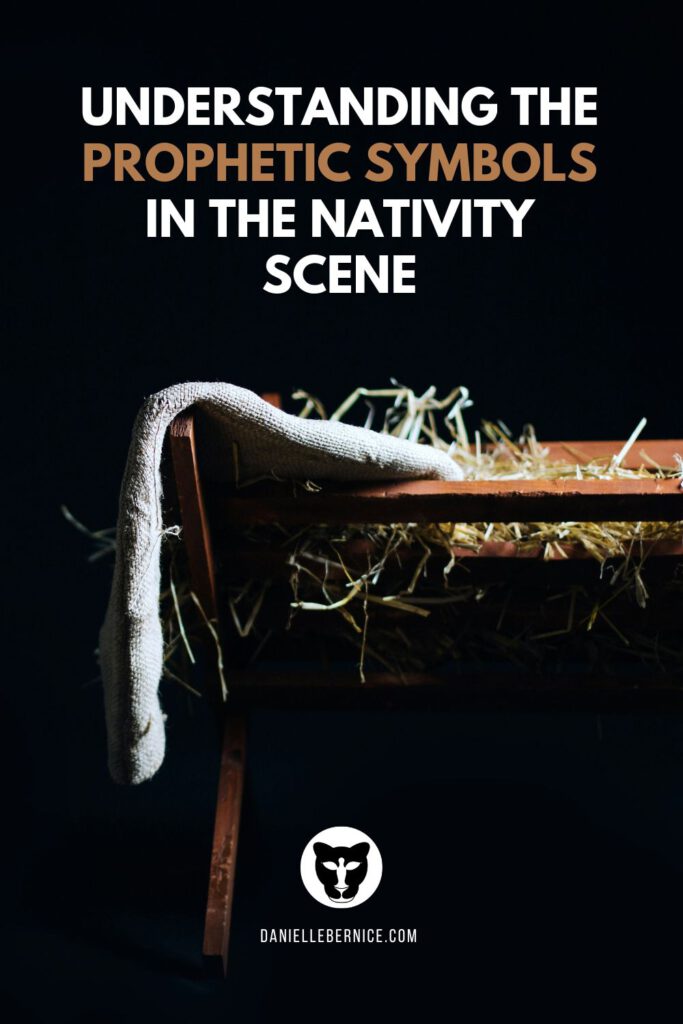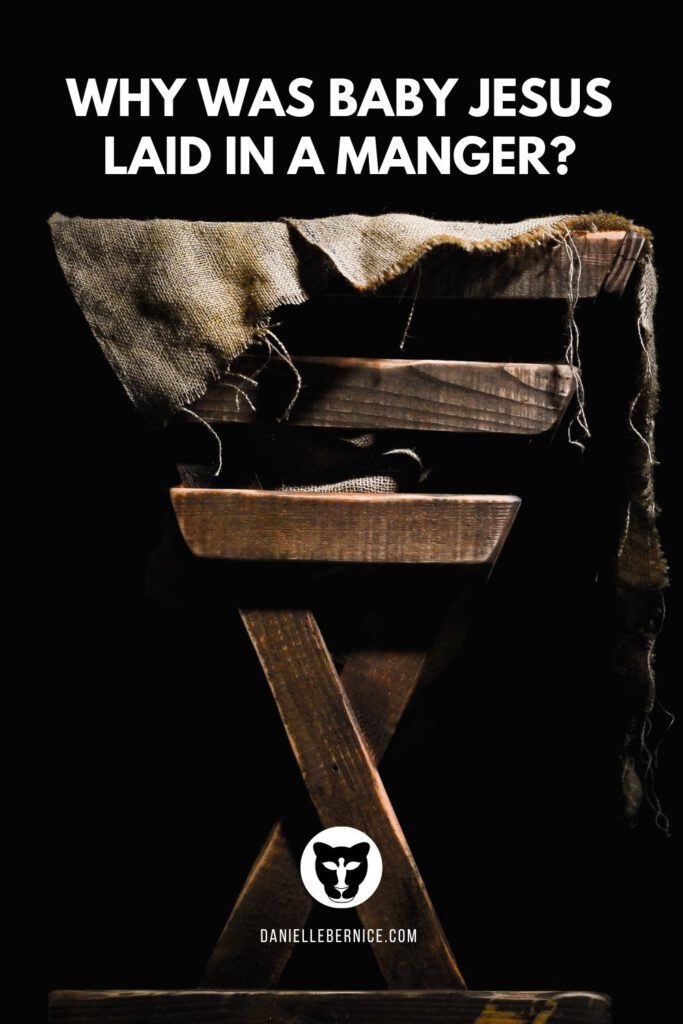You will probably have seen the nativity scene depicted every Christmas, but do you know why these events had to happen in this particular way? Why did Jesus come to earth as a baby? Why was Jesus laid in a manger? Why was Jesus born in Bethlehem? What were the meanings of the gifts brought by the wise men? And, why is it important to know?
There is a specific purpose and a prophetic, spiritual significance behind all of the famous Christmas elements surrounding Jesus’ birth. Let’s uncover the answers to key questions about the birth of Jesus with the help of the Holy Spirit.
Why understanding the symbolism is important
“Thus says the Lord who made the earth, the Lord who formed it to establish it—the Lord is his name: Call to me and I will answer you, and will tell you great and hidden things that you have not known.” (Jeremiah 33:2-3, ESV)
Understanding why Biblical events happened a certain way, is important for understanding Who God is. God is everywhere all at once, and He knows all things. This means that He knows all things ahead of time. He knew everything about us, even before we were born (Psalm 90:2-4, 139:16, Romans 9:10-13).
It’s impossible to imagine what that entails, but it is not hard to imagine that if you were loving and kind and knew things ahead of time, you would use this knowledge to warn people against making choices that would lead to their demise. In the same way, our wise God uses His knowledge to our benefit.
With great patience, He continually shows us how and where we can find Him so that we won’t be destroyed by our own foolish and sinful behavior. He teaches us about Himself in every way imaginable: through the earth that He created, through the relationships we have with one another, and most of all through His very Own Word.
What would a Book look like if it was breathed out by our all-knowing God, Who wants to protect us because He loves us? It would be filled with predictions, warnings, and guidelines, to lead us to love, joy, peace, and everlasting life with Him. We can find all this and more in the Bible. Yet, so many Christians read the Bible as if it is a history book, depicting stories that have occurred, but are now outdated, or no longer valid and applicable.
Nothing can be further from the truth! And to prove this very point, Jesus had to be born in Bethlehem, wrapped in cloths, and laid in a manger.

Why the King of kings came to earth as a baby
“For God so loved the world, that he gave his only Son, that whoever believes in him should not perish but have eternal life.” (John 3:16, ESV)
When you believe in righteous judgment, you will understand that any sin against a perfect, holy, and eternal God is an eternal sin that deserves eternal punishment. In comparison to perfection, every little sin is a gigantic sin that distances us from God by making us very unlike God. So, without forgiveness, everyone would deserve a punishment and eternal separation from God that would last beyond death: hell.
But we have just established that God is not only perfect, holy, and righteous, but He is also loving, kind, patient, and merciful. He wants the best for His children. So, He gave His people warnings and rules to follow, which are recorded in His Word. Every time His people failed to follow those rules, His Law, they had to sacrifice something dear to them so that they wouldn’t suffer the eternal punishment they deserved.
The Law was good, it taught us what righteousness is, but it can’t be kept by human strength alone; we need the Holy Spirit to help us with this.
God’s brilliant plan
Since God is all-knowing, He already knew that we would fail at keeping all of the rules and regulations, so He had prepared a permanent solution. Throughout the first 39 books of the Bible, the Old Testament, we can read all kinds of prophecies that talk about His plan for this permanent solution: He would come down from heaven to mankind, and fulfill the rules and regulations in the Old Testament by sacrificing Himself in our place. And since He is perfect and eternal it would be the perfect sacrifice and the only one needed for all eternity. He would take all of our sins upon Himself, accept the punishment we deserved, and die by crucifixion. Then, after 3 days, He would rise again, defeating sin and death.
The amazing effect of this plan is that anyone who continually trusts in this eternal, perfect sacrifice of the Word of God in the flesh, will be saved from sin and death.
Of course, God cannot die, therefore He had to be born of a human so that His flesh would be mortal. So, when the time was right, He was miraculously born from His Spirit and a virgin and was named Jesus (meaning: ‘the Lord saves’). The Son of God; fully God, fully man.
You can read a wonderful prophecy of what would happen to Mary and her offspring (which includes all Christians) in Isaiah 54.
Why this “low-key” birth?
“Hear, you deaf, and look, you blind, that you may see!” (Isaiah 42:18, ESV)
People often wonder why the King of kings would come to earth in such an “unspectacular” way compared to today’s standards. If you look at today’s world leaders or pop stars, it seems that greatness is equated with an impressive show that contains bright lights, loud announcements, and singing or dancing.
Well, actually there was an impressive show, perhaps one of the most impressive shows ever performed on earth. The Bible tells us about a moving star (Matthew 2:2), a great light (Luke 2:9), an angel announcing Jesus’ birth (Luke2:9-12), and an army of angels expressing praises (Luke 2:12-14). No idol in the world has ever been able to demonstrate that amount of power and presence!
It almost seems like a waste that most of this amazing display was only seen by a few shepherds who were understandably awestruck and overjoyed. Perhaps the turnout would have been greater if people hadn’t ignored or misunderstood the invitation in God’s Word.
I’m saying this somewhat tongue-in-cheek because I know that everything went according to God’s plan. But the truth is that God always deserves more glory, more praise, more attendance, more of everything: He is God!
But, instead of acknowledging the greatness of our God, people choose to ignore Him or deny Him so that they can live their lives the way they want, or they curse Him because He doesn’t fit their mold.
The Messiah unrecognized
People have always wanted to fit God into the mold of their own idea of a god. Whether that idea has the form of a golden calf, a mysterious energy, a genie in the bottle ready to cater to everyone’s desires, or an angry bearded man on a cloud striking everyone dead with rays of thunder. But the reality is that God is unimaginable, incomprehensible, and untouchable. His identity and character are revealed through the Word made flesh: Jesus (John 1:14-18). That’s why the way He came to earth says a lot about Who He is.
That is if you can hear and see; due to spiritual blindness and deafness, even most of His own people didn’t recognize Him. They took their denial as far as attempting to kill Him multiple times because they couldn’t stand the light He was shining onto their darkness. The Light had to be dimmed before it could expose their sin and shame. Most of today’s people essentially do the same; as long as they believe that Jesus is not the Messiah, or that He is dead, they carry on living in darkness.
Interestingly, the men who did recognize that the King of the Jews was born and followed the light to worship Him weren’t from Israel, they were foreigners from the East (Matthew 2:1-18).
This is in line with the plan that God had for His people: God used the sin of the Jews and the faith of the Gentiles to provoke the Jews to jealousy so that they too could be saved (Romans 11:11).
So you can see that the way Jesus was born, was quiet and unspectacular only to the deaf and blind. And that was precisely God’s intention.
Why Jesus had to be born in Bethlehem
“But you, O Bethlehem Ephrathah, who are too little to be among the clans of Judah, from you shall come forth for me one who is to be ruler in Israel, whose coming forth is from of old, from ancient days.” (Micah 5:2, ESV)
It was foretold that Jesus would be born in Bethlehem. But why there, of all places?
I believe there is more than one reason for this. But the most important reason, in my opinion, is the fact that this village was providentially named Bethlehem, meaning ‘House of Bread’. This means that the name of His birthplace had always foretold the coming of the Bread of Life (John 6:35).
Bethlehem was also named Ephrath or Ephrathah, both meaning fruitful. This is not a coincidence either. To properly understand why I say this, we have to go back to a time about 1500 years before Jesus was born. In those days, God had promised Jacob that he would become fruitful (Genesis 35:11) and he had 13 children; the first generation of the people of Israel.
The book of Genesis explicitly points us to the fact that Jacob’s beloved wife Rachel had died on their way to Bethlehem while giving birth to their youngest son due to hard labor (Genesis 35:16-20). The fact that Jacob’s lastborn was born right before reaching Bethlehem is meaningful. Because at the time of Jesus’s birth, being a descendant of Jacob was one of the ways in which the Israelites put confidence in the flesh (Philippians 3:3-5). They focused on physical fruit, rather than spiritual fruit. They were impressed with physical bread from heaven, supposedly coming from Moses, rather than the true Bread, the Bread of Life given by God (John 6:28-35).
None of Jacob’s fruit was born in “Fruitful” or “the House of Bread”, but God’s Firstborn was. And God’s Firstborn Son, Jesus, would bear the fruit that God had in mind.
This is how the event of Jesus’s birth in Bethlehem, beautifully marks a new era: The end of the Old Covenant with its focus on the physical (works and human offspring), and the start of the New Covenant with its focus on the spiritual (faith and fruit of the Spirit).
Why was Jesus wrapped in cloths?
“And this will be a sign for you: you will find a baby wrapped in swaddling cloths and lying in a manger.” (Luke 2:12, ESV)
Beyond the obvious fact that newborn babies are swaddled (wrapped tightly) to be kept comfortable and warm, even this act has a spiritual significance. Jesus was swaddled with strips of cloth, presumably linen.
In Exodus and Leviticus, we can read many examples of holy things being wrapped or covered in linen. The curtains in the temple were made from linen (which has prophetic meaning itself) and the anointed priests were fully clothed in linen. These linen clothes, especially the underwear, had to always be worn by the priest and his offspring when ministering near God (Exodus 28:42-43, Ezekiel 44:17-19). The Levitical priests couldn’t come to God without their linen clothes and a sacrificial animal (Leviticus 16:3-4), but Jesus was the sacrifice Himself.
As you know, Jesus came to fulfill the Law and bring a better covenant. He was born to be our great High Priest forever, offering an eternal sacrifice for our sins before God (Hebrews 4:14, 7:20-28). He ended His fulfillment of the Law by leaving the linen cloths behind, in the grave, where the dead belong. He is alive, and we are made alive through Him, no longer needing these superficial “dead” elements to become holy. All we need is His living Spirit, Who guides us into holiness.
Why gold, myrrh, and frankincense?
“And going into the house, they saw the child with Mary his mother, and they fell down and worshiped him. Then, opening their treasures, they offered him gifts, gold and frankincense and myrrh.” (Matthew 2:11, ESV)
If you understand the previous connection between linen and priestly holiness, then you can also see why the wise men brought gold, frankincense, and myrrh: These three gifts weren’t only seen as precious in those days, they were also brought to the priest as tithes and offerings.
Gold was used abundantly in and on the temple, and the temple is symbolic of Jesus (which is a whole other topic).
Frankincense was used on grain offerings and the Bread of the Presence (Leviticus 2, 24:7). Jesus became our grain offering and our Bread.
The scent of myrrh was greatly appreciated and it was used as an ingredient to make sacred anointing oil, which was to be used only to anoint priests (Exodus 30:23-32). Jesus would become our High Priest. Myrrh was also traditionally used as an ingredient for embalming, and so it was used on Jesus’s body when it was wrapped in linen cloths and buried (John 19:39-40).
All of this means that the gifts were symbolic of the various rules and regulations Jesus came to fulfill. The wise men who brought these offerings to Jesus might have understood the symbolism better than anyone in those days. Or perhaps it was merely providence, and they had no clue that their gifts were tremendously meaningful.

Why was Jesus laid in a manger?
“And she gave birth to her firstborn son and wrapped him in swaddling cloths and laid him in a manger, because there was no place for them in the inn.” (Luke 2:7, ESV)
There was no place for them in the inn (or guest room) because it was very busy in Bethlehem at that time because of all the people who came to be registered in response to the emperor’s decree. Mary and Joseph could easily have thought that everything was against them:
- They were judged because Mary was pregnant before she was married.
- They had to travel a long distance (likely 4 to 5 days) from Nazareth to Bethlehem while in the last stages of pregnancy.
- Then after that long and tiring journey, there was no room to rest and no clean place to give birth. Instead, Mary had to give birth in a place meant for animals.
But even though it must have felt like an uphill battle, everything went exactly according to God’s plan. Because Jesus had to be laid in a manger to fulfill another prophecy. That is why the manger, to me, is the most beautiful symbol of all of them.
As you know, a manger is a feeding trough. The flocks or herds that were kept in that place would come to eat or drink from these mangers. That is why it makes perfect symbolic sense that Jesus was laid in a manger. Because we are Jesus’s flock and we are supposed to be fed by Him:
- He is our Great Shepherd, and shepherds feed their flocks (Psalm 23:1, Matthew 2:6).
- He is our Source of Living Water (John 4:10, 7:37).
- He is the Bread of Life, the spiritual Bread that we should live by each and every day (John 6:27-35).
- He was sacrificed so that we can live by His blood and His flesh; we celebrate this through Communion until the day He returns (John 6:51-58, 1 Corinthians 11:26).
Every prophecy fulfilled
Isn’t all of this amazing? The Gospel writers gave us some insight into how Jesus fulfilled the prophecies about Him, but if you dig deep enough, you can find many more prophecies and ways in which Jesus fulfilled them. This means that there is much more to it than I was able to write in this article. Therefore, I encourage you to dig deep into the Word too. Seek, and you will find Him everywhere in the Old Testament.
Jesus fulfilled everything that was written about Him in the Law and Prophets, and He can open your mind to understand the Scriptures so that you can see it too (Luke 24:44-45).
Besides the amazing prophetic symbolism in the event of Jesus’ birth, the way things transpired also tells us about God’s amazing character.
Our humble King wasn’t born in a palace to be served by maids and be surrounded by gold. Our God is a God Who serves. He is the King Who, for our sake, left heaven to be born amid filth and manure. He is the King Who took the punishment that we deserved. And He is the King Who chose to be broken so that we can be restored.
Thank You, Jesus, for Your inconceivable kindness and mercy!

